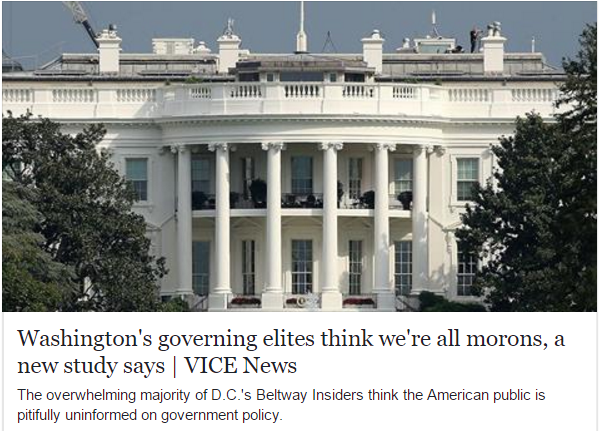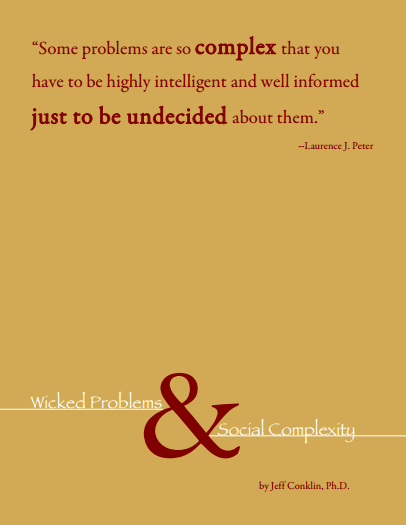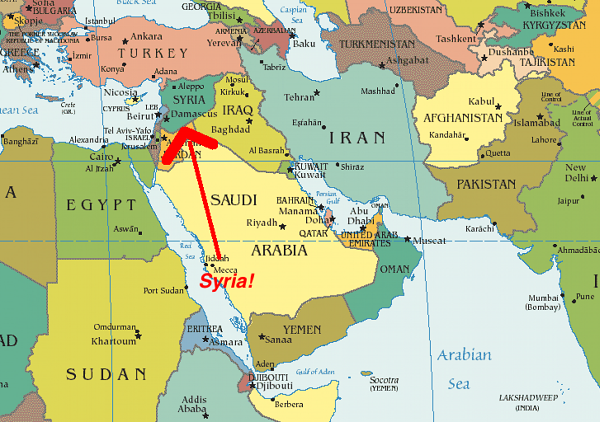Washington’s governing elites think we’re all morons
[ by Charles Cameron — a study in the mighty and their lowly, knowledge and ignorance, truth and falsehood ]
.
Vice News, Washington’s governing elites think we’re all morons
**
First, if you’ll permit, the simple truth:
Some problems are so complex that you have to be highly intelligent and well informed just to be undecided about them.
That’s Laurence J Peter, and it’s a quote so succinct and powerful that Jeff Conklin puts it, in large print, above the title of his pamphlet on wicked problems:
The simple truth is that the truth is complex, beyond the minds of elites and morons, deplorables and desirables alike.
**
Next, the untruth:
The untruth is in a view down the nose from one human person at another, or at a group, a crowd, a mob — a diversity of others.
Clinton:
You know, to just be grossly generalistic, you could put half of Trump’s supporters into what I call the ‘basket of deplorables’. Right? The racist, sexist, homophobic, xenophobic, Islamaphobic – you name it.
Romney:
There are 47 percent of the people who will vote for the president no matter what. All right, there are 47 percent who are with him, who are dependent upon government, who believe that they are victims, who believe the government has a responsibility to care for them, who believe that they are entitled to health care, to food, to housing, to you-name-it. That that’s an entitlement. .. These are people who pay no income tax. Forty-seven percent of Americans pay no income tax. So our message of low taxes doesn’t connect. .. And so my job is not to worry about those people. I’ll never convince them they should take personal responsibility and care for their lives.
Such sentiments remind me irresistably of the Magnificat — given here in my own version:
He is not one who is ashamed to show his strength,
and buffets proud folk about like leaves in a gale.
He upsets those that hold themselves high and mighty
and rescues the least one of us.
He feeds the hungry,
and tells the rich they can go fetch their own food.
**
And then the nuance..
Let’s start with the fact that I’m a snob. I’m an almost equal-opportunity despiser. I prefer not to act on my snobbery, except when choosing which sorts of books and music I wish to consume, but it’s there in me, like an undertow, like an unrest.
Now we’ve gotten that out of the way, here’s the setup, as described in What Washington Gets Wrong:
73 percent of government officials think the public knows little or nothing about programs aimed at helping the poor, 71 percent of them think the public knows little or nothing about science and technology policy, and 61 percent of them think the public knows almost nothing about childcare. In fact, when it comes to fundamental policy areas like social security, public schools, crime, defense and the environment, it was hard to find government officials who thought the public knew “a great deal.”
Assuming Americans know so little, government officials tend to use their own judgment rather than the people’s when making policy decisions. With issues of science and defense, more than half of officials think they should “always” or “mostly” heed their own opinions. With crime, welfare and the environment, at least 42 percent of officials who felt the same way.
Okay, first off, government officials — how well do they stack up?
This is from Counterpunch — it’s a succinct summary of a Jeff Stein piece from the New York Times:
There are very few people in the U.S. government who understand basic Islamic history or even regard it as important. In 2002 Silvestre Reyes (D-Tex.), the incoming chairman of the House of Representatives Permanent Select Committee on Intelligence, was asked by a reporter whether al-Qaeda was Sunni or Shiite. “Predominantly — probably Shiite,” he responded stupidly. And what about Lebanon’s Hizbollah? “Hizbollah. Uh, Hizbollah . . . Why do you ask me these questions at 5 o’clock?” He later added, “Speaking only for myself, it’s hard to keep things in perspective and in the categories.” Obviously the Intelligence Committee chairman was unaware that Hizbollah is a Shiite organization aligned with Shiite Iran and Shiite-led Syria against al-Qaeda-type Sunni Islamist forces.
Jeff Stein, the national security editor of Congressional Quarterly, wrote a New York Times op-ed in 2002 highlighting the (bipartisan) ignorance among Washington “counterterrorism officials” including key Congressional committee members about the divisions within Islam. He had asked many of them the fundamental question, “What’s the difference between a Sunni and a Shiite?” and was shocked by their responses. “Most American officials I’ve interviewed,” he concluded, “don’t have a clue.” Rep. Jo Ann Davis, Republican Congresswoman from Virginia then heading the subcommittee overseeing much of the CIA’s work with Muslim assets, told Stein, “The Sunni are more radical than the Shia. Or vice versa.” (In other words, all Muslims are radical; it’s just a question of degree. Talk about Islamophobia. And talk about ignorance!)
Alabama Republican Congressman Terry Everett, head of a subcommittee on tactical intelligence, told Stein after some briefing, “I thought it was differences in their religion, different families or something. Now that you’ve explained it to me, what occurs to me is that it makes what we’re doing over there extremely difficult.” In 2001, after FBI counterterrorism chief Gary Bald had publicly revealed his ignorance about Islam, FBI spokesman John Miller declared such knowledge to be unnecessary, and indeed made it a point to belittle it. “A leader needs to drive the organization forward,” he told Stein. “If he is the executive in a counterterrorism operation in the post-9/11 world, he does not need to memorize the collected statements of Osama bin Laden, or be able to read Urdu to be effective. … Playing ‘Islamic Trivial Pursuit’ was a cheap shot for the lawyers and a cheaper shot for the journalist. It’s just a gimmick.”
That was in 2006, ten years after Osama bin Laden’s Decxlaration of War against the United States, and five years after the 9/11 attacks on New York and Washington.
In fact, one might say, when it comes to fundamental policy areas like defense.. government officials aren’t necessarily terribly savvy. And I’m relieved to know that by March 2014, at least, the then Chairman of the Joint Chiefs, Gen. Martin Dempsey, knew that ISIS has an “apocalyptic, end-of-days strategic vision.”
Of course, if Dabiq falls, as it very soon many, that strategic vision may get stretched to breaking point..
**
So much for government officials. What of the general population, down on whom those paragons of virtue look?
In November 2002, a year after the 9/11 attacks, according to National Geographic News:
In a nation called the world’s superpower, only 17 percent of young adults in the United States could find Afghanistan on a map, according to a new worldwide survey released today.
Ast forward to 2006, and a National Geographic-Roper Public Affairs Geographic Literacy Study of American youth between ages 18 and 24 finds:
Six in ten (63%) cannot find Iraq on a map of the Middle East, despite near-constant news coverage since the U.S. invasion of March 2003. Three-quarters cannot find Indonesia on a map ñ even after images of the tsunami and the damage it caused to this region of the world played prominently across televisions screens and in the pages of print media over many months in 2005. Three-quarters (75%) of young men and women do not know that a majority of Indonesiaís population is Muslim (making it the largest Muslim country in the world), despite the prominence of this religion in global news today. Neither wars nor natural disasters appear to have compelled majorities of young adults to absorb knowledge about international places in the news.
Of course, that’s young people.
Young people today .. if you want to dismiss these findsings .. or young people are our future .. if you want to let the impact settle in.
**
Here, for my convenience, is a map kindly provided by The Washington Post in 2013, in an intriguing Ezra Klein piece aptly titled Most Americans can’t find Syria on a map. So what?
Maybe Firesign Theater had it right when they titled their 1971 album: I Think We’re All Bozos on This Bus.






October 3rd, 2016 at 4:10 pm
Ever seen the movie Idiocracy? We’re heading there…
For your viewing pleasure:
https://www.youtube.com/watch?v=BBvIweCIgwk
October 9th, 2016 at 4:19 pm
So the very well paid paper pushers in Dc figure us in the great unwashed mass of flyover people don’t know much about the details of the various federal policies. They are right. We don’t. We do know about results though. We may not know the details of anti-poverty policies but we do know that the black family has been thoroughly shattered since the 60s and a black child has less that a 30% chance of being born into a family with a mother and father married and living together. We do know that current interest rates are clawing the guts out of savers even if we don’t know much if anything about fiscal policy. We can see plainly the grads of public schools don’t read, write and figure very well even if we have no idea at all how to comply with No Child Left Behind regulations. We see all this plainly, the opinions about us held by sore headed, overpaid bureaucrats who are three parts resentful they are not fully appreciated for their vital contribution to the revision of paragraph A of subsection K of the revised standard of compliance guidelines that are currently awaiting final approval to the contrary.
.
It seems to me that Kipling, as usual, had something valuable to say about this. “An’ it’s Tommy this, an’ Tommy that, an’ anything you please;
An’ Tommy ain’t a bloomin’ fool — you bet that Tommy sees!”
October 9th, 2016 at 4:42 pm
Hi Carl:
.
I take your point with regard to domestic policy, but wonder about foreign policy — anhy comments on that side of things?
October 10th, 2016 at 7:15 am
Charles:
.
It is the same. All those Ivy League grads inside the Beltway are very intimately acquainted with every complexity and nuance of any foreign place you care to name. They write at length about them and find each other’s work very impressive. Us Deplorables can’t follow those arguments. We didn’t go to the right schools. We only go by what we see; the Taliban stronger than it has been since 2001, Vlad the Great conquering, American sailors on their knees before some Persian power boaters, Jihadi killers having their own country and two plain enemies of the United States of America, the House of Saud and the Pak Army/ISI, repeatedly hailed as allies and even being subsidized. It is madness that only people blinded by their own self-perceived brilliance can’t see as plainly as the sun in the sky. But Tommy sees. We see.
.
As is stated in some of your linked articles, I think it is a bit of a cheap shot to criticize people for not knowing where this or that country is. It would be a legitimate gripe if people formed their opinions and acted upon them in complete isolation. But they don’t. When something happens we talk it over with our friends and relations; and somebody knows where Tajikistan is and somebody else knows who is next door and the annoying cousin is motivated to do some reading. Some time passes and we have a pretty good idea of what is going on. And we have an even better idea of what fools our so called betters are.
October 10th, 2016 at 10:16 pm
Just saw this, from the CFR & National Geographic Survey on Global Literacy of “1,203 people aged eighteen to twenty-six who currently attend or have recently attended a college or university in the United States, whether a two-year or four-year institution:
Not that I should claim any superiority — my own knowledge is appallingly thin in some places, non-existent in others.